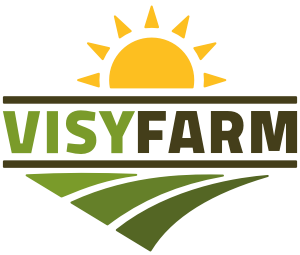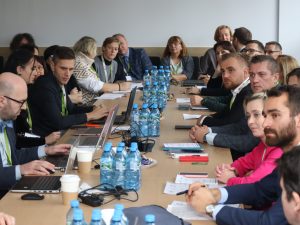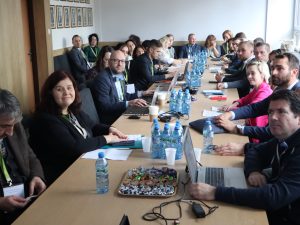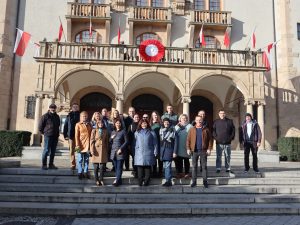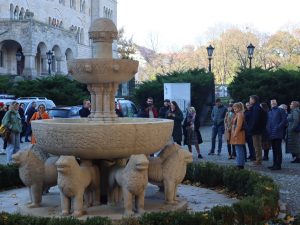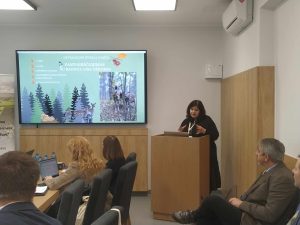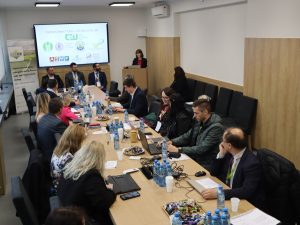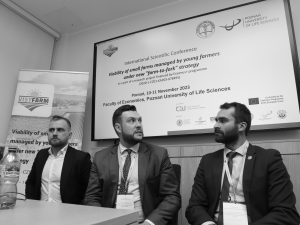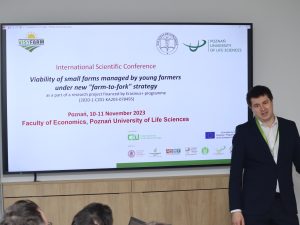VISYFARM project “Viability of small farms managed by young farmers in the context of the Farm to Table strategy” Final conference at the University of Life Sciences in Poznan, Poland
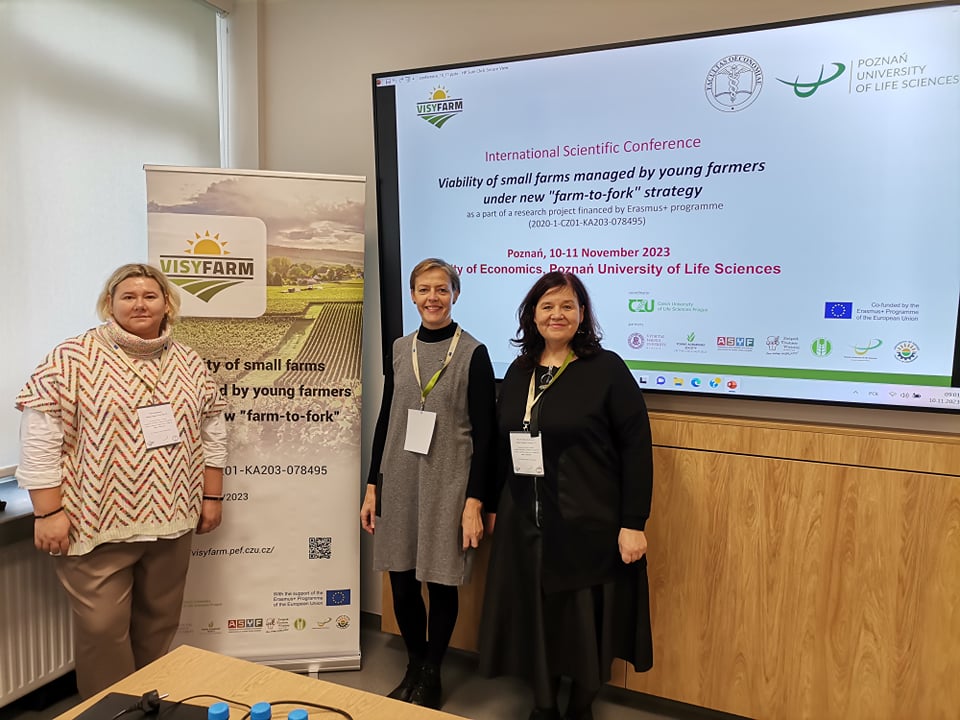
Prof. dr. V. Atkočiūnienė, doc. dr. J. Zaleckienė and doc. Erika Zabulionienė participated in the final conference of the Erasmus+ project VISYFARM “Viability of Small Farms Managed by Young Farmers under New Farm-to-Fork Strategy” (2020-1-CZ01-KA203-078495) at the University of Life Sciences in Poznan (Poland), on 10-11 of November, 2023.
The project is coordinated by the Czech University of Life Sciences in Prague and the partners were Poznan University of Life Sciences (Poland), University of Szeged (Hungary), Vytautas Magnus University of Agriculture (Lithuania), Slovak University of Agriculture in Nitra. The link between science and practice is ensured by the associations representing young farmers: the Czech Association of Young Farmers, the Polish Union of Rural Youth and the Slovak Association of Young Farmers (ASYF).
The Green Deal for Europe’s “Farm to Table” strategy seeks strategic solutions in the agriculture and food supply chain and changes in production to move towards sustainable and low-carbon farming. The strategic objectives of the Common Agricultural Policy (CAP) 2021-2027 focus on the viability and resilience of farms and rural areas, the balance of market forces in the food supply chain and competitiveness, and generational change.
An international team has prepared an overview and evaluation of previous and new CAP measures for young farmers running small farms. The good practices collected and analysed help to understand how farms can work together to develop short food supply chains and improve their long-term economic and social situation. Another outcome of the project will be the development of Farming Decision Support Tools using IT.
The plenary session of the final conference of the project included presentations on the participation of small-scale farmers in short food supply chains, and the identification of measures to help farms cope with the challenges posed not only by the Covid-19 pandemic and the war in Ukraine, but also by climate change and increasing uncertainty. Insights were shared on the transformation of food systems, as well as the challenges of smallholder farm viability in the context of farm succession and generational change.
In the second part of the closing conference, representatives from each partner country presented the results achieved by the VISYFARM project. The Polish project partner, Prof. Wawrzyniec Czubak, UPP, presented the role of smallholder farms, which account for a significant proportion (50-65%) of the total number of farms, in the overall rural ecosystem. It was pointed out that young farmers strive to be active and innovative players in the market, to establish themselves and to remain competitive in the market. All the participants of the conference were engaged by the presentation of Prof. Dr. V. Atkočiūnienė, (VMU AA) on the best practices of small farm development in Lithuania. The mobile farm “Bagota ciba”, the farm “Vilkės Farm”, which promotes sustainability in production and love for the environment, and the Šironai family farm, which connects several generations of the family, were presented. The speakers pointed out that there are many opportunities in rural areas, thanks to EU structural and national support measures, European Innovation Partnership initiatives, changing consumer lifestyles, and partnerships between different market players.
The importance of partnerships in organising short food supply chains was discussed by Habil. Dr Kris Krisztián. Cooperation between farmers facilitates business growth, more efficient investment of EU structural support, reduction of operating costs, etc. Although the benefits of partnerships are clear, the involvement and participation in agricultural cooperatives has quite different traditions in different EU countries. As generations of farmers change, attitudes towards cooperation change, as do the models of cooperation themselves. Young farmers are more open to innovation and the digitalisation of business.
The project partners from Slovakia, Assoc. Prof. Dr. Patric Rovny and Ing. Dr. Jana Gálová from the Slovak University of Agriculture in Nitra, presented a practical digital tool – a spreadsheet for young farmers to make informed business decisions. The project coordinating partner from the Czech Republic, Dr. Pavel Kotyza, presented a digital tool for comparing market prices of agricultural products or inputs.
The project partners aim to ensure that the results are not just reported, but used in practice or for further research and shared with students.
The last part of the conference included a young farmers’ panel “Small Farms and Young Farmers – Recommendations for Development”, where young farmers shared their experiences in developing their farms and the activities of the young farmers’ organisations they represent, as well as their insights on the general situation in agriculture, agricultural policy, sustainability, the benefits of cooperation and other issues of relevance to small farms.
On the second day of the meeting, VISYFARM participants walked around the city of Poznan celebrating the St. Martin’s Day and Polish Independence Day, tasted and enjoyed St Martin’s croissants.
